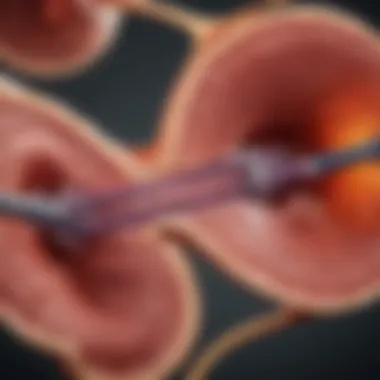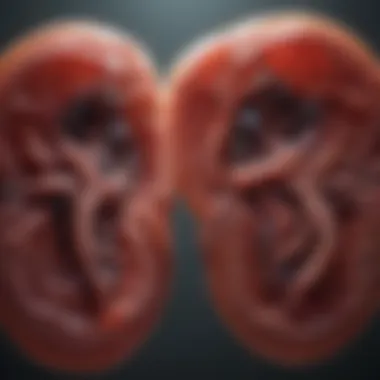Understanding Kidney Function Decline with Age


Intro
As we journey through life, our bodies inevitably undergo a myriad of changes. Among these transformations, the decline in kidney function is notably significant. While many may casually acknowledge that aging is a natural process, the intricacies of how this specifically impacts renal health often reside in the shadows of general discourse. The kidneys, responsible for filtering waste and balancing bodily fluids, do not escape the hands of time. In fact, their functionality can diminish with each passing year, which can lead to serious health implications.
Rather than merely accepting this decline as an unavoidable fate, it’s crucial to explore the underlying mechanics at play. Understanding factors such as age, lifestyle, and certain health conditions can illuminate the risks associated with decreased kidney function. Therefore, recognizing these aspects enables us to implement proactive measures that might help preserve renal health long into our later years.
In this first section, we’ll delve into recent advances that shed light on how modern science is approaching renal aging, as well as the signs and symptoms that one should watch for as they age.
Intro to Kidney Function and Aging
Understanding the interplay between kidney function and aging is crucial as it lays the groundwork for recognizing how our health changes as the years go by. The kidneys, small but mighty organs, are responsible for filtering waste and excess fluids from the blood. They also help regulate blood pressure, electrolyte balance, and red blood cell production. As such, any decline in their performance can lead to far-reaching consequences for overall health. This article provides a comprehensive look at the connections between renal health and aging, uncovering not only the mechanisms of decline but also the implications for those approaching their senior years.
Understanding Kidney Function
When we delve into kidney function, we find that it’s not just about waste removal. The kidneys maintain homeostasis by adjusting the body’s fluid balance and pH levels. They do this through nephrons, the functional units of the kidneys, with each healthy kidney containing about a million nephrons. These tiny units filter blood plasma, which results in urine production.
A salient point to note is that kidney function is often measured by the glomerular filtration rate (GFR). This rate decreases naturally with age, typically beginning around the age of 30. However, many individuals may not even notice the gradual changes occurring within their bodies until they encounter more serious health issues well into later life. Understanding how renal efficacy wanes as we age can provide insight for patients and practitioners alike.
The Aging Process and Its Impact on Physiology
Aging impacts not only the kidneys but the entire body’s physiology. As we grow older, our body undergoes a myriad of changes—both in structure and function. Collagen and elastin, essential for maintaining the elasticity of tissues, diminish over time. This can lead to reduced vascular compliance, which inadequately influences renal blood flow.
Moreover, older adults frequently contend with comorbidities such as hypertension and diabetes, which further complicate kidney health. As these conditions often lead to increased pressure on the kidneys, they can exacerbate the decline in effective nephron count.
There’s a classic saying: "Age is just a number." While that may ring true in certain aspects, when it comes to kidney function, the reality is that age brings a whole host of physiological challenges that cannot be ignored. It becomes vital for elderly individuals and their healthcare providers to stay vigilant and proactive about renal health.
"The human body is a sacred vessel, one that requires continuous attention as it ages. Neglecting any part of this system, including the kidneys, can lead to cascading health effects that are hard to reverse."
Anatomy and Physiology of the Kidneys
Understanding the anatomy and physiology of the kidneys is pivotal when discussing kidney function decline with age. The kidneys play a fundamental role in maintaining homeostasis within the body, managing waste removal, fluid balance, and electrolyte regulation. Grasping how these organs operate not only provides insight into how they are affected by aging, but it also underlines the consequences of renal decline on overall health.
The kidneys are comprised of unique structures that facilitate their various functions, including the filtration of blood, reabsorption of essential nutrients, and excretion of wastes. When these structures begin to wear down due to age or illness, it can lead to significant health issues. Moreover, understanding their anatomy helps elucidate the biological changes that occur as one ages, underlining the necessity of proactive health management.
Structural Overview of the Kidneys
The kidneys are two bean-shaped organs located on either side of the spine, just below the rib cage. Each kidney consists of an outer cortex and an inner medulla. The cortex contains millions of microscopic units called nephrons, which are the functional units responsible for filtering blood, removing waste, and regulating fluid levels.
Key Components of Kidney Structure:
- Cortex: The outer layer where filtration occurs.
- Medulla: Contains the renal pyramids that assist in the concentration and excretion of urine.
- Nephrons: Each kidney holds about a million of these tiny structures, responsible for the kidney's primary functions.
As one ages, changes in the kidney's anatomy can be subtle but impactful. For instance:
- There's a gradual reduction in the number of nephrons.
- The renal arteries may thicken, leading to reduced blood flow.
- Structural changes in the nephron can affect filtration and reabsorption processes.


Nephron Functionality and its Importance
Nephrons are fundamental to renal function, making their health paramount for the overall well-being of an individual. Each nephron works by filtering blood plasma, allowing waste products and excess substances to be excreted while reclaiming what the body needs. The nephron consists of a glomerulus and a series of tubules which together manage urine concentration.
The importance of nephron function becomes especially clear as the body ages. With advancing age, the efficiency of nephrons diminishes. Here are some key points about nephron functionality and its implications:
- Filtration: Nephrons filter approximately 50 gallons of blood a day. A decline in number or efficiency leads to accumulating waste in the bloodstream.
- Reabsorption: They reabsorb essential nutrients such as glucose and electrolytes. Age-related decline can cause nutrient loss, affecting overall health.
- Fluid and Electrolyte Balance: Aging nephrons may struggle to maintain the right balance, contributing to conditions like dehydration or excessive fluid retention.
By maintaining nephron health through lifestyle changes, one may slow the decline of kidney function.
In summary, comprehending the intricate structure and functionality of the kidneys is essential for grasping how aging affects kidney health. It also lays the groundwork for discussions on strategies for prevention and management of renal decline, crucial for preserving quality of life as one ages.
Mechanisms Behind Kidney Function Decline
The relationship between aging and kidney function is no small feat to grasp. While it’s widely accepted that the aging process brings about various physiological changes, understanding how these changes specifically impact kidney function is crucial. This section delves into the mechanisms behind kidney function decline, highlighting the specific elements that shape renal health as we grow older. It’s these mechanisms that serve as a lens through which one can truly appreciate the challenges posed by aging and the subsequent impact on kidney efficiency.
Changes in Renal Blood Flow
Renal blood flow is a pivotal factor influencing kidney health. As individuals age, the blood vessels can become less elastic, which often leads to a decrease in overall blood flow to the kidneys. This reduction isn’t like flipping a switch; it’s gradual, sneaking up on those affected. The kidneys rely heavily on this flow to filter waste and balance fluids in the body. As blood flow diminishes, the functionality of nephrons—those tiny yet significant structures responsible for filtration—will inevitably face decline. It’s a cascading effect: less blood leads to inefficient filtering and, in time, might culminate in chronic kidney disease.
"Renal blood flow can decrease by an average of 10% for each decade after the age of 30, which underscores the importance of monitoring kidney health as time goes on."
Increased vascular resistance and various cardiovascular issues, also common in older adults, can compound this problem. Hence, maintaining a healthy cardiovascular system is equally important for protecting kidney function.
Decreased Nephron Count with Aging
Nephrons, the functional units of the kidneys, are critical for proper renal function. Interestingly, the nephron count does not remain static with age; it follows a downward trajectory. Research suggests that individuals might lose around 30-50% of their nephrons between the ages of 30 and 70. This decrease can stem from various sources, including hypertension and diabetes, both of which are increasingly prevalent in the aging population.
As the number of nephrons dwindles, existing nephrons are then forced to take on a heavier workload. This compensation can only last so long before they succumb to the added strain, leading to further deterioration of kidney function. Therefore, understanding nephron loss is not just a mere academic concern; it has far-reaching implications for how kidneys function in later life.
Alterations in Glomerular Filtration Rate
Glomerular filtration rate (GFR) is another critical metric of kidney function that tends to decline with age. GFR essentially measures how well the kidneys are filtering blood. Beginning in the early adulthood phase, GFR rates begin a decline that becomes more pronounced as one ages. This decline is significant because a lower GFR often correlates with higher risks of kidney disease and other health problems.
Impairments in GFR can arise from a multitude of factors, such as vascular changes and chronic conditions like diabetes or hypertension. Importantly, a worsening GFR often signals that a person’s kidneys are becoming less effective at removing waste from the body, presenting a larger health issue that cannot be overlooked.
Factors Contributing to Renal Decline in the Elderly
Understanding the factors that contribute to renal decline in older adults is crucial in addressing kidney health. The older folks among us face a complex interplay of elements that can accelerate the decrease in kidney function. By unraveling these factors, healthcare providers can formulate targeted interventions and strategies that may curb this decline. The focus here will zero in on three primary contributors: chronic illnesses and comorbidities, medication use that can lead to nephrotoxicity, and the lifestyle choices related to diet and hydration that directly influence renal health.
Chronic Illness and Comorbidities
As individuals age, the prevalence of chronic diseases such as diabetes and hypertension typically rises. These conditions are instrumental in the decline of kidney function. Chronic kidney disease (CKD) is often seen as a complication of these illnesses, creating a vicious cycle where worsening kidney health exacerbates the primary disease. For example:
- Diabetes: High blood sugar levels over time can damage the kidney's filtering units, the nephrons. This damage impairs the kidneys' ability to filter waste and regulate fluid balance effectively.
- Hypertension: Elevated blood pressure can lead to sclerosis of the renal arteries, which diminishes blood flow to the kidneys and reduces their overall functionality.
Moreover, as older adults often juggle multiple chronic conditions, the cumulative effect can lead to accelerated renal decline. Tight control of these ailments is paramount. Regular monitoring and proactive management can play a vital role in reducing risks associated with kidney function decline.


Medication Use and Nephrotoxicity
Another significant factor contributing to renal decline is the use of medications, especially in the elderly who frequently take multiple prescriptions. Certain drugs are known to be nephrotoxic, meaning they can harm kidney function. Common culprits include:
- Nonsteroidal anti-inflammatory drugs (NSAIDs): Regular use can lead to acute kidney injury, particularly in older adults with pre-existing kidney issues.
- Antibiotics: Some classes, like aminoglycosides, have a well-documented potential to cause renal impairment, especially in high doses or prolonged use.
Aging reduces the kidneys' ability to excrete these medications properly, thus increasing the risk of toxicity. Careful medication management is essential to balance the treatment of existing health conditions while protecting renal function. Initiating dialogue with healthcare professionals regarding alternatives, dosages, and durations of use can create safer management plans.
Lifestyle Factors: Diet and Hydration
Lifestyle choices regarding diet and hydration have long-lasting effects on kidney health. Poor dietary habits can lead to conditions that negatively impact kidney function. Here are important considerations:
- Sodium Intake: High salt consumption can lead to increased blood pressure, consequently affecting kidney health. Adopting a low-sodium diet may help manage blood pressure and reduce the burden on the kidneys.
- Hydration: Proper hydration is important for kidney function. Dehydration can lead to concentrated urine, which may increase the likelihood of kidney stones. Drinking enough water helps flush out toxins and promotes overall renal health.
- Dietary Patterns: A balanced diet rich in fruits, vegetables, whole grains, and lean proteins can provide essential nutrients that support kidney health, while excessive sweets and processed foods can contribute to obesity and related kidney issues.
"Optimal dietary choices and adequate hydration may significantly reduce the risk of kidney-related problems as one ages."
The significance of these factors in the overall decline of kidney function cannot be understated. By understanding chronic conditions, being cautious with medications, and making sound lifestyle choices, older adults can take proactive steps toward maintaining healthier kidneys. Through education and awareness, it is possible to make informed decisions about health, potentially leading to improved quality of life in the golden years.
Clinical Implications of Reduced Kidney Function
The decline in kidney function can be a significant concern for older adults, as it intricately ties into various aspects of health and well-being. Understanding these implications is crucial, especially when considering how they can affect a person's quality of life as they age. One cannot emphasize enough just how essential the kidneys are. They don’t merely filter waste; they balance electrolytes, regulate blood pressure, and support overall metabolic health.
A decrease in kidney functionality can lead to a cascade of issues that impact not only renal health but also other parts of the body. The risks associated with deteriorating kidney function extend well beyond the renal system and can create complex health challenges requiring vigilant care.
The kidneys play a pivotal role in maintaining the body's equilibrium; their decline can shift health landscapes dramatically.
Risks of Chronic Kidney Disease
Chronic Kidney Disease (CKD) is a prominent issue for elderly populations. Various studies suggest that age-related factors such as reduced nephron numbers and altered blood flow directly contribute to this risk. CKD can often develop silently over the years, with many individuals being unaware of their deteriorating condition until it reaches an advanced stage. Symptoms like fatigue, swellings, or even changes in urination might not be associated with kidney issues until it’s too late.
- Early-stage indicators: Persistent fatigue, changes in appetite, and mild edema can signal the onset of CKD.
- Associated conditions: Diabetes and hypertension frequently co-exist with CKD, exacerbating the decline in renal function.
The implications of CKD stretch far and wide, as it can lead to kidney failure over time, requiring dialysis or renal transplantation. Understanding this connection is vital for implementing preventive strategies and monitoring.
Impact on Other Organ Systems
The kidneys are often referred to as the body’s natural filtration system, and rightly so. When kidney function decreases, the subsequent impact can unsettle the harmony within other organ systems. For instance, untreated kidney impairment can significantly affect cardiovascular health. Inadequately filtered blood can result in hypertension, leading to greater strain on the heart and blood vessels.
One cannot disregard the cascade of issues stemming from renal decline:
- Cardiovascular complications: Elevated blood pressure and increased heart workloads can push heart muscle health into challenging territories.
- Bone density: Kidneys help regulate calcium and phosphate, hence their impairment can lead to conditions like osteoporosis.
The repercussions on various organ systems highlight the critical importance of maintaining healthy kidney functionality throughout the aging process.
Challenges in Medication Management


With the advancement of age, medication regimens often expand, sometimes leading to potential complications, particularly concerning kidney function. The kidneys play a crucial role in drug metabolism and excretion. When renal function declines, the body’s ability to process medications can diminish, leading to the accumulation of drugs in the system, which can be detrimental.
To navigate through these pitfalls, here are some considerations:
- Dose adjustments: Careful monitoring and adjustment of medication dosages are critical for individuals with reduced kidney function.
- Avoiding nephrotoxic medications: Certain drugs, like non-steroidal anti-inflammatory drugs (NSAIDs) and some antibiotics, can worsen renal function. Understanding which medications pose risks is crucial.
Preventative Strategies and Management
Understanding how to keep your kidneys working well is vital as you age. With decline in kidney function affecting many older adults, taking steps early can really make a difference. Preventative strategies play a crucial role in maintaining renal health. They not only can help ward off chronic kidney disease but also enhance overall wellbeing.
Lifestyle Modifications for Kidney Health
Aiming for healthier lifestyle choices is perhaps the most impactful preventative strategy to consider. What does that mean, exactly? Here are some adjustments that can benefit kidney health:
- Hydration: Staying hydrated is pivotal. When you drink enough water, you help your kidneys remove waste effectively. It’s not just about quenching thirst but ensuring your body has the necessary fluids to function smoothly.
- Balanced Diet: Focus on a diet that’s rich in fruits, vegetables, and whole grains. Plant-based foods like lentils and beans are not just nutritious but also support kidney function. Limit salts and processed foods, as they can exacerbate issues.
- Regular Physical Activity: Keeping your body moving keeps not only your heart healthy but also supports kidneys. Regular exercise can help manage blood pressure and prevent diabetes, both important for renal health.
- Limiting Alcohol and Quitting Smoking: These habits can contribute to kidney damage over time. Reducing alcohol intake and quitting smoking not only supports renal health but enhances overall health too.
Regular Screening and Monitoring
Getting into the habit of regular screenings offers peace of mind. Early detection of kidney issues can help implement necessary interventions before they escalate. Here are essential aspects of monitoring:
- Blood Pressure Checks: High blood pressure can silently harm kidneys. Regular monitoring at home or during doctor visits can help catch any concerning rise early.
- Routine Blood Tests: Simple blood tests can check creatinine levels, which indicate kidney function. Keeping tabs on these markers allows for timely medical advice if something appears amiss.
- Urinalysis: This test can reveal the presence of protein in your urine, often an early sign of kidney damage. Testing your urine periodically can thus safeguard your health.
Regular appointments with a healthcare provider are vital. They can assist in interpreting the results and suggest any adjustments in lifestyle or medication if required.
Education and Awareness Programs
Knowledge is power. Engaging in education and awareness programs can inform about kidney health and risks associated with aging. These programs often cover:
- Understanding Risk Factors: People should learn about risks like diabetes, high blood pressure, and the role of certain medications in kidney health.
- Symptoms of Kidney Issues: Many don’t realize symptoms until it’s too late. Programs can help participants recognize signs such as swelling, fatigue, or changes in urination that warrant immediate attention.
- Strategies for Healthy Living: Workshops and discussions often empower individuals with practical tips to improve their kidney health, including meal planning and exercise guides.
Knowledge alone doesn't keep kidneys healthy, but combining awareness with proactive management can truly preserve kidney function well into older age.
The End
The dynamic nature of research in renal health has mushroomed over the years, offering a clearer lens through which we can view kidney function decline as we age. As kidney health significantly influences overall bodily functions, including hydration, electrolyte balance, and waste excretion, the implications of its decline cannot be overstated. This part of the article encapsulates vital elements that have been discussed previously and underscores the importance of continuous exploration in this field.
The Evolution of Renal Health Research
Renal health research has undergone a transformation, akin to a caterpillar morphing into a butterfly. In the earlier days, studies primarily focused on acute kidney issues and less on chronic conditions. Over time, it has been recognized that the kidneys play a crucial role in numerous bodily processes.
Recent research delves deeper into understanding how aging impacts the kidneys at a cellular level. With advancements in technology, scientists can now explore the molecular changes that accompany age-related decline. For example, the role of oxidative stress in kidney aging has received growing attention.
Moreover, the research community began taking social factors into account. Socioeconomic status, lifestyle choices, and even mental health can significantly affect kidney health. This holistic viewpoint emphasizes that preventing kidney diseases is not merely about medical interventions but also about improving the overall quality of life. Researchers now expand their reach by harnessing interdisciplinary collaborations, combining insights from nephrology, geriatrics, and public health.
Future Directions in Kidney Research
Looking ahead, the future of kidney research is as promising as a sunrise that lights up a dark horizon. Clinical trials aimed at targeting the aging process within kidney tissues are on the rise. There’s an increasing focus on regenerative medicine and the potential for stem cell therapy in restoring kidney function. Not only this, but precision medicine is also gaining traction. The idea of treating kidney decline with tailored therapies based on individual genetic makeup is not just science fiction anymore.
Additionally, the role of artificial intelligence cannot be overlooked. AI tools are being designed to analyze vast amounts of data from kidney function tests, paving the way for earlier identification of renal decline. Such advancements can facilitate prompt interventions, thus potentially staving off chronic kidney disease.
Research also aims to further comprehend the impact of dietary choices and new pharmacologic agents on renal health. Understanding the link between various nutrients, hydration levels, and kidney function could significantly change dietary recommendations for older adults.
In summary, the importance of kidney research will only grow as our population ages. By refining our knowledge and maintaining a proactive approach, we can better equip ourselves to address the challenges that arise with kidney function decline. Understanding and mitigating these issues is crucial not only for the individual but also for society as a whole.















